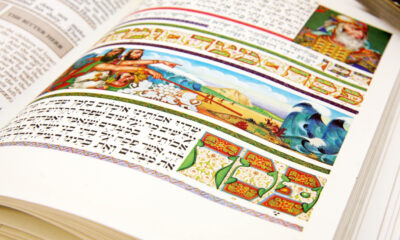
Religion

The four heroines who saved Jews from slavery
One of the most striking features of Exodus is the presence of so many heroic women. This emerges clearly from a simple reading of the text at the beginning of the book of Shemot.
Four remarkable heroines are presented as playing a pivotal role in the unlikely liberation from slavery. Each one stands as a woman of courage, heroism, and defiance against the evils of the Egyptian empire.
The first two we meet are midwives Shifra and Puah. This is the only time they are mentioned by name, and we have no idea from the simple reading of the text who they are. They are presented to us in an ambiguous way, which can be interpreted in ways that totally change their identity.
In the verse, they are called “hameyaldot ha’ivriyot”, which could either mean Hebrew midwives or the midwives of the Hebrews. If they are Jewish midwives, then they are identified by our sages as the mother-daughter combination of Yocheved and Miriam or perhaps the daughter and mother-in-law combination of Yocheved and Elisheva.
The verse could also mean that they are the midwives of the Hebrews, suggesting that they were Egyptian midwives who were designated to attend to the birth of the Hebrews. This is the opinion of Abarbanel and Rav Shmuel David Luzzatto (Shadal). The latter makes a strong argument that it’s unlikely that Pharaoh would demand that Jewish midwives kill the children of their own people. Even at pain of death, it doesn’t seem feasible that they would murder their own kind.
In short, it’s not clear whether they are Jews or gentiles, Hebrews or Egyptians. What’s crystal clear, though, is their astonishing steadfastness and moral courage to stand up against the empire of evil. They refuse to expedite the death and murder of innocent children because, as the Torah highlights, “they feared G-d”. Their values and morality gave them the courage and heroism to stand up for what they believe in, and not kill innocent people, no matter the consequences. They are the incredible heroines of chapter one. It’s through their heroism and their heroism alone that the decree to kill every Jewish male didn’t succeed during the time of slavery and persecution.
If Shifra and Puah are the heroines who saved young Jewish male babies, then the survival and birth of one Jewish baby in particular, the future redeemer of Israel, was dependent on three other women. This is the focus of chapter two. Strangely, none are mentioned by name, but all played a decisive role in the life of the one individual mentioned by name in this saga – Moshe.
During the terrible time when Pharaoh decreed that all Hebrew male babies be killed, it was completely understandable why many Jewish couples would choose not to have children. The future seemed hopeless: newborn sons would be murdered at birth, while daughters would face a life of slavery under Egyptian masters in a community depleted of Jewish men.
Yet despite this grim reality, the Torah tells us of a courageous act: a man from the house of Levi married a woman also from the house of Levi, and they conceived a child. Our sages interpret this as a profound act of defiance and hope, bringing new Jewish life into the world even in the darkest of times, refusing to surrender to despair despite the horrific circumstances surrounding them.
These are the parents of Moshe: Yocheved and Amram. Our sages identify the real heroine as the young Miriam, the older sister of the yet-to-be-born Moshe. Her parents had separated during the decree to avoid having children, and it was Miriam who confronted and admonished them for not wanting to bring children into the world, thereby hastening the demise of the Jewish people. By singlemindedly cajoling her parents, they were reunited, and Moshe was born.
Our sages likely identified Miriam as playing this pivotal role because the Torah explicitly mentions her heroism soon after the birth of her baby brother. When he was hidden among the bulrushes, Miriam actively protected her brother. Showing remarkable courage, she approached Pharaoh’s daughter, who had discovered him and cleverly suggested a Hebrew nurse, creating the perfect opportunity to connect Yocheved, their mother, with her son while he remained under royal protection.
The other remarkable heroine is, of course, Pharaoh’s daughter. She commits the most blatant act of defiance against her father not only by saving but adopting Moshe to the palace while secretly allowing his mother to feed him. She daringly brings up a Jewish child literally in the very palace of the king who single-mindedly decreed the death of every Jewish male child. As we know, this very baby spared by Pharaoh’s daughter will defeat Pharaoh himself and liberate his entire people.
It’s remarkable how many women, Jewish and gentile alike, were defiant, heroic, and courageous, bringing about the salvation of the Jewish people in the birth of the heroic saviour. Shifra, Puah, Miriam, Yocheved, and Pharaoh’s daughter.
Two remarkable things stand out. First, the spirit of human and Jewish heroism in the face of impossible circumstances – heroic Jewish women doing all they can for the survival of their people, and heroic Egyptian women living by their conscience and internal moral compass. That right should triumph over might, and conscience over power.
There’s an unmistakable spirit of female courage and heroism which uniquely brings about the salvation of the Jewish people. It’s their daring defiance and courage for the sake of either love for their people or the pursuit of truth and justice that saves the day.
It’s therefore not surprising that our sages make a powerful comment about the spirit of the women of that time: “In the merit of righteous women our forefathers were redeemed from Egypt.” (Sotah 11b).
Our sages teach that this righteousness extended beyond just the named heroines, embodying the remarkable courage and life-affirming spirit of all women of that generation. While Jewish men endured crushing physical labour daily, women took extraordinary measures to sustain their people’s future.
The sages describe how these women, seeing their husbands exhausted from brutal work, would make themselves attractive and visit the fields where their husbands rested. There, they would create moments of intimacy to conceive children, ensuring Jewish continuity. Through these acts of defiance, these women uplifted an entire generation, enabling the Jewish people to survive and eventually rise from the darkness of Egyptian oppression.
In our own generation, we witness this same remarkable heroism. For a year-and-a-half, Israel has endured the suffering of war. Women were among those who lost their lives on that tragic day of Simchat Torah, with many subjected to barbaric torture, while others were taken captive and endured inhumane treatment. Meanwhile, primarily male combat soldiers have been killed and injured by the thousands.
Throughout this ordeal, it’s the mothers, wives, daughters, sisters, and grandmothers who have demonstrated extraordinary courage, sustaining the spirit of the entire Jewish people. They have preserved their households while separated from spouses, children, and parents, often performing the roles of two people to maintain family stability.
The wives of reservists have carried on for months without their husbands. More than 300 women now raise families alone after losing their husbands. Among the hostage families, mothers have become the public face of endurance, bearing tremendous suffering with remarkable fortitude. Across society, women lead numerous initiatives supporting the war effort and civilian needs.
In Jewish law, women are generally exempt from time-bound mitzvot. Yet, curiously, women are obligated in the time-bound mitzvot of Purim and Pesach. Why? Our sages explain that “they, too, were involved in the miracle of the day”.
Some interpret this to mean that women suffered equally under Haman and Pharaoh’s evil decrees. Others suggest a deeper meaning: women weren’t merely victims, they were active agents of salvation who defied these antisemitic oppressors. It was Esther who courageously confronted Haman, and the heroic women of Egypt who helped reverse Pharaoh’s deadly decree. Their participation wasn’t passive but pivotal to the redemption itself.
Like then, today, it’s the heroic women of our generation who play a pivotal part in lifting the spirit of our people and fulfilling their critical role in the ongoing redemption of our nation.
- Rabbi Doron Perez is the executive chairperson of World Mizrachi










